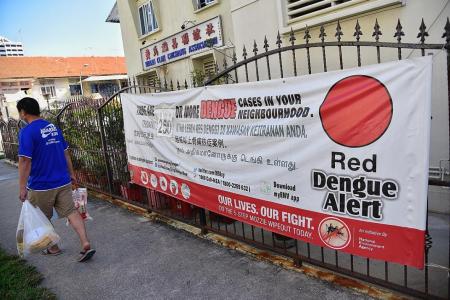Three more dengue deaths in Singapore as outbreak worsens
Singapore enters sixth consecutive week with infections topping 1,000 cases
Three more people have died of dengue fever, bringing the total for the year to 19 deaths as Singapore experiences an outbreak that is unprecedented here.
Those who died were 49 to 92 years of age. Of them, 17 were working or living in a dengue cluster. Last year, a total of 20 people died of dengue.
There are now 413 active dengue clusters concentrated mostly in the eastern part of the country.
This is the sixth consecutive week with dengue infections topping 1,000 cases.
There were 1,736 infections diagnosed last week, 65 more than the previous week. Until this year, the highest weekly infection was 891 in 2014.
Since January, 18,673 people have been infected, a number exceeded only in 2013, when 22,170 people were infected in the entire year.
According to the Ministry of Health, 17 per cent, or more than 3,100 people, have been hospitalised in public hospitals this year for dengue; and about 1 per cent of them were so sick they had to be admitted to intensive care.
In spite of efforts by the National Environment Agency (NEA) to halt the spread of the mosquito-borne disease, the number of active clusters continues to increase.
Of the 413 active clusters, 141 are classified as high risk as they had 10 people or more infected within 150m of each other within a two-week period.
There are now 19 huge clusters with 100 people or more infected. The two biggest, each with 260 cases, are in the Aljunied-Geylang-Guillemard area (147 breeding sites found) and the Bukit Panjang-Woodlands area (51 breeding sites found).
The single block with the most people infected is Block 608 in Senja Road with 33 cases.
The third super cluster is in the Mountbatten Road area with 234 people infected and 73 breeding sites found.
The NEA said it conducted more than 454,000 inspections islandwide in the first six months and uncovered about 11,700 mosquito breeding habitats.
It said in the months of May and June, it found 50 per cent more breeding in homes and twice the number in condominium grounds, construction sites, common areas and other places like schools.
The increase could have been due to less maintenance carried out during the two-month-long circuit breaker from April 7 as movement was restricted.
There was also the dormitory outbreak, reducing workers available to do the tasks.
NEA has taken action against the owners of more than 2,000 premises for mosquito breeding. The penalty has also been raised from last Wednesday for those caught breeding mosquitoes.
Instead of a fine of $200 for the first three infringements, the fine for households is now $300 if breeding is found after they have been served notice that they are in a dengue cluster, or if more than one breeding spot is found.
Get The New Paper on your phone with the free TNP app. Download from the Apple App Store or Google Play Store now


